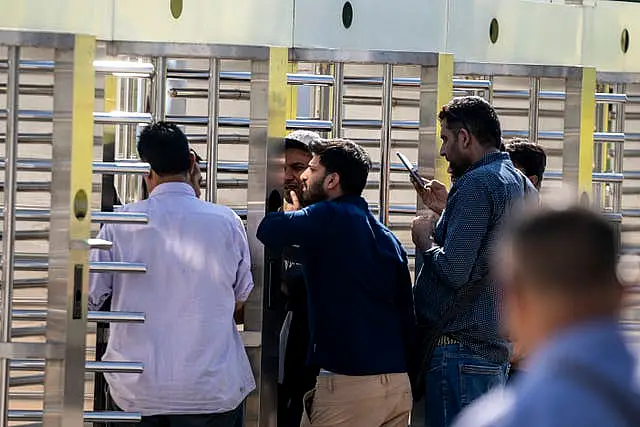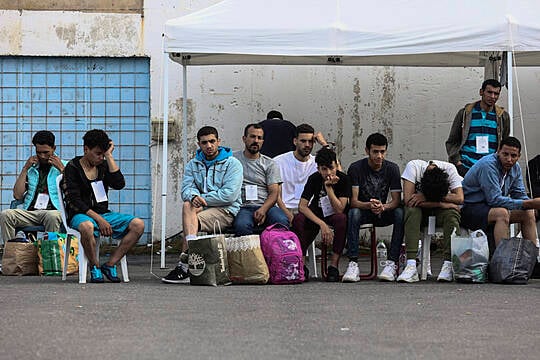Nine men suspected of crewing a migrant-smuggling ship that sank off Greece, leaving more than 500 missing, appeared in court on Tuesday for questioning.
Their court appearance came as new accounts emerged on the sinking and the appalling conditions on the trip from Libya towards Italy.
The Egyptian men face charges that include participation in a criminal organisation, manslaughter and causing a shipwreck. The hearing took place in Greece’s southern city of Kalamata.
Only 104 men and youths – Egyptians, Pakistanis, Syrians and Palestinians – survived one of the worst migrant shipwrecks in the Mediterranean Sea early on June 14.

Eighty-two bodies have been recovered, the last on Tuesday, as a large search continued for a seventh day.
Survivors said women and children were trapped in the hold as the ship capsized and sank within minutes, to one of the deepest spots in the Mediterranean.
New survivor accounts emerged on Tuesday confirming that about 750 people paid thousands of pounds each for a berth on the battered blue fishing trawler, seeking a better life in Europe.
In sworn statements provided over the weekend, and seen by The Associated Press, survivors described shocking conditions on the five-day journey.
Most of the passengers were denied food and water, and those who could not bribe the crew to get out of the hold were beaten if they tried to reach deck level.
The statements also echoed previous accounts that the steel-hulled trawler sank in calm seas during a botched attempt to tow it.
This clashes with the Greek coast guard’s insistence that neither its patrol boat that escorted the trawler in its last hours nor any other vessel attached a tow rope.
“The Greek ship cast a rope and it was tied to our bows,” survivor Abdul Rahman Alhaz said in his sworn statement.

“Then we moved forward, but not for more than two minutes. We shouted ‘stop, stop’ because our boat was listing. (It) was in bad shape and overloaded, and shouldn’t have been towed.”
Alhaz, 24, a Palestinian from Syria, said he paid 4,000 dollars (£3,000) to board the ship at Tobruk in eastern Libya.
He said the “people in charge” on the trawler were all Egyptians, and recognised seven men from pictures Greek authorities showed him.
“Most of the Pakistanis were in the hold, and were lost with the boat,” he said. “One of the crew had told me there were more than 400 Pakistanis on the boat, and only 11 were saved.”
These did not include the wife and two children of Rana Husnain Neseer, 23, who were in the hold. Mr Neseer himself, who said he paid 7,000 euros (£6,000) for the trip, travelled on deck.
“About 750 people were on board,” he said. “(The crew) didn’t give us food or water, and hit us with a belt to keep us from standing up.”
He said other passengers told him that a tow line was attached by a “big ship” just before the sinking. He did not see that “as I was bent low and praying”.
But he felt the vessel sharply list. “We all went to the other side to balance it, which made our boat tilt in the other direction and sink,” added Mr Neseer, who recognised four of the survivors as crew members.
Fellow Pakistani Azmat Khan Muhammad Salihu, 36, identified three men, including one who hit him when he tried to leave the hold, and one who struck passengers with a belt.
Being in the hold, he had no first-hand account of why the ship sank and said there were no women and children in his section below decks.
“I was saved because I found an opening and got out,” his statement said. “I called to the others to follow me but nobody managed to escape.”
Greece has been widely criticised for not trying to save the migrants before the sinking in international waters.
Officials in Athens say the passengers refused any help and insisted on proceeding to Italy, adding that it would have been too dangerous to try to evacuate hundreds of unwilling people off an overcrowded ship.
Asked about the incident as World Refugee Day was marked across the globe on Tuesday, European Commission President Ursula von der Leyen said: “It is horrible, what happened, and the more urgent is that we act.”
Ms Von der Leyen said the EU should help African countries like Tunisia, where many migrants leave for Europe, to stabilise their economies, as well as finalise a long-awaited reform of the EU’s asylum rules.
She did not, however, mention Libya, from where the doomed trawler and many similarly overloaded Europe-bound boats depart across the particularly dangerous Mediterranean migration route.
More than 110 million people are displaced around the world.
On #WorldRefugeeDay, we reiterate the EU's commitment to improve the situation of millions of refugees caught up in conflicts or major humanitarian crises.
Joint statement with HR/VP @JosepBorrellF ↓— European Commission (@EU_Commission) June 20, 2023
Five other human smuggling suspects were arrested in Pakistan this week and some allegedly confessed to sending some of the Pakistanis who were on the trawler, officials in Islamabad said.
Relatives of at least 124 people in Pakistan have contacted authorities to find out about missing loved ones believed to have been on the trawler, the officials said.
The full details of the sinking remain unclear. Photos and videos from before the sinking show people crammed on all available open spaces of the trawler.
One survivor, Ali Sheikhi from the northeast Syrian town of Kobani, told Kurdish TV news channel Rudaw that the smugglers did not allow life jackets and threw whatever food the passengers had into the sea.
Speaking on Sunday phone from a closed reception centre near Athens where survivors were taken, Mr Sheikhi said he was directed to the hold but paid the smugglers to go out on to deck.
By the time the ship sank they had been at sea for five days. Water ran out after a day and a half, and he said some passengers resorted to drinking seawater.
Mr Sheikhi also said the trawler went down after its engine broke down and another vessel tried to tow it.
“In the pulling, (the trawler) sank,” he said.







